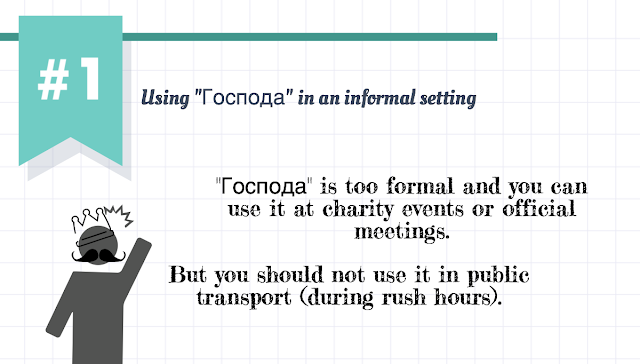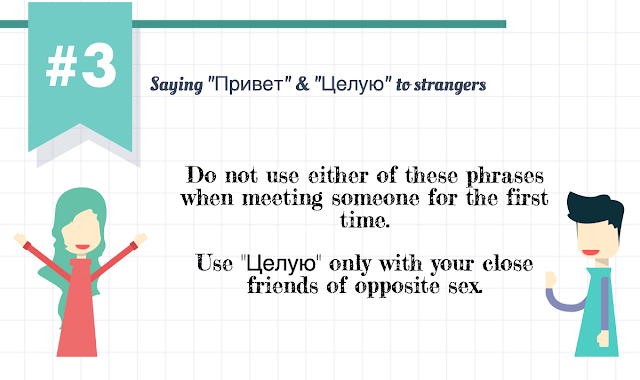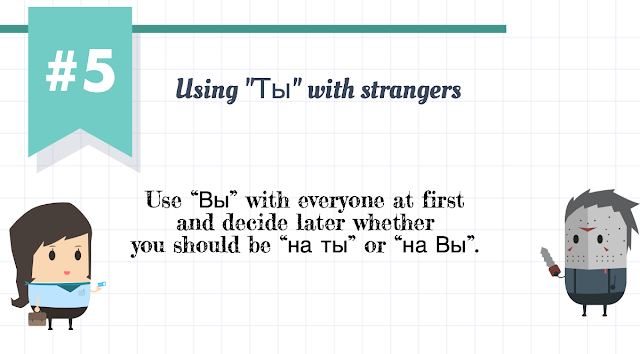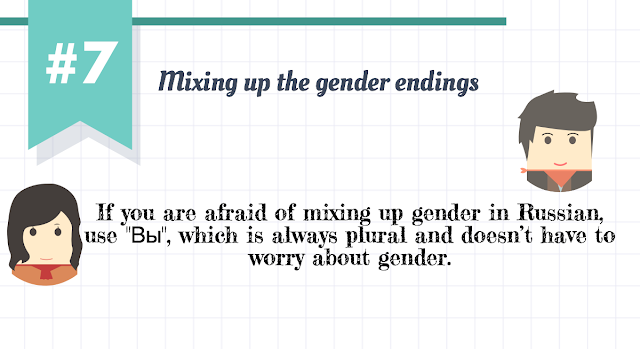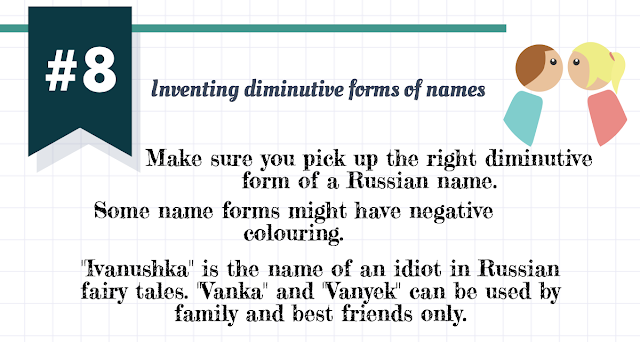10 Awkward Mistakes To Avoid When Speaking Russian
https://www.learningtoknowrussian.com/2015/05/mistakes-to-avoid-speak-Russian.html
Even if you have excellent pronunciation and make very few grammar mistakes, speaking Russian can be quite tricky. I remember one of my friends, an excellent Russian student, complaining to me that people would laugh at him or even get upset when he addressed them as “Господа!” (Gentlemen!).
Why did he get that response? Isn’t “Господа” an appropriate, respectful way to address someone?
It turned out that my friend was using “господа” to address people in the metro and at kiosks. Instead of answering, people would often quote to him from a popular Soviet film, “Господа все в Париже!” ("The gentlemen are all in Paris").
I started thinking about how foreigners can run into problems even when they don’t make any grammatical mistakes. It turns out there are some things you shouldn’t say in Russia.
If you’re not careful, you might even offend someone! But don’t worry, I’ve put together a helpful list featuring the Top 10 “Russian Traps” for foreigners.
1. Let’s start with the most harmless mistake you can make: addressing someone as “Господа” in an informal setting. “Господа” is much too formal to use on public transit and in other public settings like the gym, grocery store or movie theater. On the other hand, you are welcome to use it at the theater, the casino or at a charity event, as well as official meetings and high class gatherings. Just be careful around older people with Soviet upbringings. They may find it offensive.
2. Asking “Как дела?” when someone is not a close friend. Unlike English, “Как дела” is not a casual greeting in Russian. Instead, most Russians will feel like you’re trying to pry. Instead of mumbling a one-word reply, like and American would, your Russian acquaintance will spend a few seconds desperately trying to remember who you are and why you feel comfortable enough to ask about personal matters. Use casual "Привет" or neutral Добрый день /Доброе утро / Добрый вечер.
3. Saying “Привет” as a greeting and “Целую” as a goodbye. During a first meeting, both of these phrases can be taken the wrong way, especially with the older generation. It’s okay to say “привет” to someone you know well or to a friend. As for “целую”, it is "girly word", and you should only use it with opposite sex friends that you know very well.
If you are just starting to study the language and only know a few phrases...don’t worry, people will be willing to forgive you simply because you’re trying to speak Russian!
4. Proverbs and sayings from foreign Russian language textbooks (“Пир горой”, “Без сучка и задоринки”, “Дело - табак”). Forget them! They’re all old fashioned! Old styles often come back into fashion when it comes to music and clothes, but that’s rarely the case with language. The only people who still use phrases like these live in the villages and are generally much older.
Update: It turned out that many Russians love proverbs and sayings! They defend them. Maybe you'd like to use them too, but remember: you have to "feel" the meaning of proverb you are going to use... otherwise, it can become the shortest way to awkward situation.
Update: It turned out that many Russians love proverbs and sayings! They defend them. Maybe you'd like to use them too, but remember: you have to "feel" the meaning of proverb you are going to use... otherwise, it can become the shortest way to awkward situation.
5. Using “ты” with strangers. Anyone older than you or someone in a position of power (your boss, for example) might be offended if you address them as “ты”. It’s especially important to be respectful around older women. Here’s my advice: you “Вы” with everyone at first and decide later whether you should be “на ты” or “на Вы”.
6. Фамилия, имя, отчество (first name, last name, patronymic). You’ll sound pretty ridiculous if you address a friend with his last name: “Привет, Иванов”, for example. But you can use a last name in an official setting: “Господин Иванов”. Around young people--in an office, for example - using someone’s first and last name is probably best. Do you want to be extra respectful? Then try memorizing someone’s first name and patronymic. To recap, use a first name with your friends, first name and patronymic to communicate respect, and a last name in a more formal setting.
7. Mixing up gender. “Ты сказал...ты подумала…” While a woman might just smile, a man is likely to get upset. What are you supposed to do, though, if you can’t keep it straight? The easy solution is to address everyone “на Вы”. Вы is always plural and doesn’t have to worry about gender.
8. Diminutive, affectionate forms for names. Some Russian names have dozens of diminutive forms. There’s a famous movie quote in Russia that goes: "Георгий Иванович, он же Гога, он же Гоша, он же Юрий, он же Гора, он же Жора..." (Georgy Ivanich, he’s Goga, he’s Gosha, he’s Yuri, he’s Gora, he’s Zhora). That’s not an exaggeration. But that doesn’t mean that you can randomly pick one of these forms and use it with a friend. Some of the diminutive names can have negative or unwanted connotations. For example, Иванушка (Ivanushka) is the name of an idiot in a Russian fairy tale, while Ванька (Vanka) and Ванёк (Vanyek) sound familiarly and even rude.
9. Russian swear words - “Мат”. Just because you can use swear words doesn’t mean you’re an advanced speaker, despite what many foreigners often believe. Instead, it’s taken as a sign that someone had a poor upbringing. Russian “мат” is also very difficult to understand grammatically. A single preposition or suffix can completely change the phrase’s meaning.
10. The most important words to get right are девушка, женщина and бабушка. The worst thing you can do as a foreigner is call a young woman a “женщина” or a middle-aged woman (under 70 years) a “бабушка”! That’s like adding 10 years to their age and telling them to their face that “they don’t look so young or good anymore.”
Update from our blog reader: Be aware of mixing up деВушка (girl, young woman) and деДушка (old man). -- Anastasia Ogneva
Update from our blog reader: Be aware of mixing up деВушка (girl, young woman) and деДушка (old man). -- Anastasia Ogneva
You can never be ready for everything in life!
However, there’s no need to feel stressed out about it. You can always find your way out of a tricky situation if you know how to make yourself comfortable, because the moment you start feeling stressed, everything seems impossible and you cannot fight the right words, and don’t know how to react to things being said by others.
So, how do you make yourself feel comfortable in a foreign country? How do find the right words? Our Russian Program for Fluency helps you speak freely, effortlessly, without any stress. Join in for FREE today!
Enrolling in the program you’ll get FREE Access To:
- THREE training videos to help you become a fluent speaker
- 10 Quick Travellers’ Notes Pocket Guide in pdf format
- 13 Essential Words to make you sound like a native
- SEVEN video lessons of Russian totalling 90 minutes
Best regards, Denis Ivanov
Co-Founder, Learning To Know
Join us:
http://course.learningtoknowrussian.com/p/join-russian-program-for-fluency

.png)

